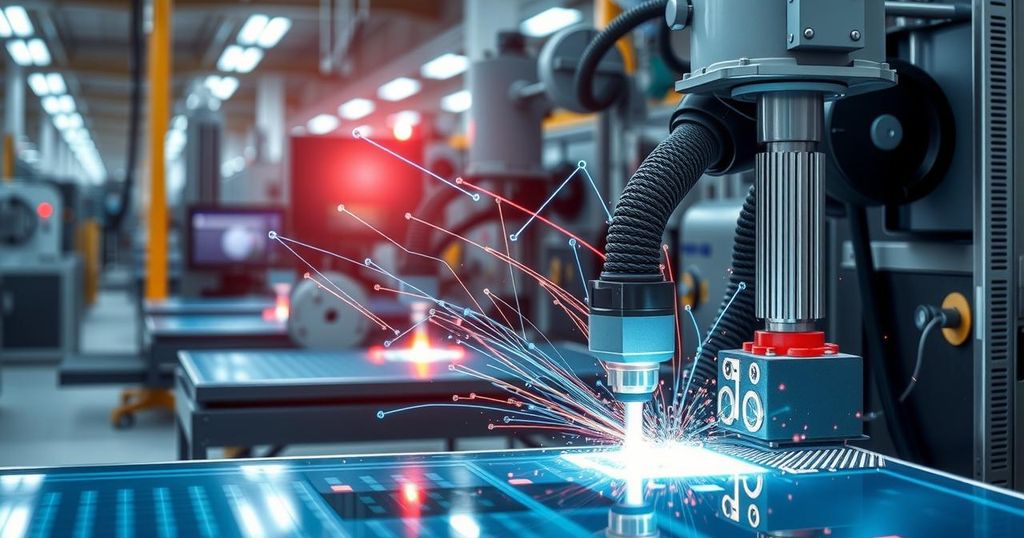Navigating the Future: Key Manufacturing Trends Driving Digital Transformation
Manufacturing is witnessing a digital transformation as trends like Industry 4.0, AI, automation, and sustainability reshape operations. Key innovations such as 3D printing and robotics enhance productivity, while sustainability initiatives respond to consumer demands. This new landscape prioritizes agility, enabling manufacturers to adapt swiftly to changes, thereby enhancing competitiveness and operational efficiency.
In the world of manufacturing, a digital renaissance unfurls as companies pivot towards agility and innovation amid rapid technological shifts. The rise of Industry 4.0 heralds an era where advanced tools like IoT, AI, and cloud computing seamlessly merge into production lines, facilitating real-time data insights that empower manufacturers. With the ability to optimize processes, enhance quality, and reduce waste, these technologies redefine efficiency, enabling manufacturers to respond swiftly to the chaotically evolving market demands and expectations.
Artificial intelligence stands as a beacon of advancement, diligently analyzing the vast seas of data collected through Industrial Internet of Things (IIoT) devices. This analytical prowess not only illuminates production trends but also acts as a guardian, anticipating equipment failures and spotting quality anomalies before they spiral into costly issues. Simplifying maintenance through predictive tech and refining supply chains enhances productivity while proactively addressing workplace safety.
Meanwhile, the advent of 3D printing revolutionizes product design and manufacturing efficiency, allowing intricate parts to emerge from the printer’s embrace in a single, swift motion. This transformative technology cuts through the constraints of traditional manufacturing, especially in sectors like aerospace and healthcare, where precision and speed are paramount. The capability to produce on-demand significantly diminishes the need for extensive inventories, creating a more responsive supply chain.
Automation and robotics take center stage, continuously elevating productivity levels while minimizing human error. Robots execute repetitive tasks with a meticulous precision that human hands often lack, further enhanced when combined with IIoT-driven analytics. This not only streamlines operations but also fosters a safer working environment, enabling personnel to focus on more complex and rewarding tasks, while machines tirelessly operate around the clock.
Sustainability emerges as a non-negotiable hallmark of modern manufacturing; as consumers demand accountability, manufacturers strive for carbon neutrality. Employing renewable resources and adopting circular economy concepts, they tackle waste head-on, forging a bond with environmentally-conscious customers.
Servitization complements this shift—transforming models from mere product sales to encompassing comprehensive services like maintenance and upgrades. This transition helps manufacturers cultivate deeper customer relationships, ensuring loyalty and creating continuous revenue channels. As manufacturers listen and adapt to customer preferences, they refine product development that resonates more effectively with market needs.
The trend of reshoring rises too, as companies seek to reclaim manufacturing from overseas, responding to global disruptions and rising costs. This strategic move offers a dual benefit of bolstering local economies while enhancing quality control.
Extended reality (XR) technologies craft immersive experiences for both employees and consumers, allowing for enhanced training environments and innovative design processes that bridge the gap between the physical and digital. This not only fills the skills gap but also enriches consumer engagement through virtual demonstrations.
As materials evolve, advanced materials redefine manufacturing capabilities, allowing sectors to innovate continually. From aerospace to medical fields, these materials ensure that products not only meet but exceed traditional capabilities, paving the way for groundbreaking advancements.
In this brave new world, digital twins create a bridge of understanding between real and virtual, equipping manufacturers with the ability to simulate and improve upon actual processes. The insights gathered from these replicas enable proactive adaptation and optimization of production systems.
Investing in cutting-edge solutions like IBM Maximo Application Suite positions manufacturers favorably for future challenges, marrying efficiency with sustainable practices. This powerful, integrated platform fosters better decision-making through insightful data analytics, pushing industries toward sustainable futures brimming with possibilities.
The manufacturing landscape has seen a revolution fueled by recent technological advancements and shifting consumer expectations, particularly expedited by the pandemic. Key trends such as digitalization, automation, and sustainability are reshaping the industry, pushing manufacturers to reassess their strategies and operations to stay competitive. The fusion of advanced technologies into manufacturing processes forms the crux of this transformation, with Industry 4.0 taking the lead by implementing IoT and AI to enhance operational efficiency.
As the manufacturing industry stands on the brink of transformation, the convergence of digital tools, robotics, and sustainability principles drives a revolutionary shift towards agility and resilience. By adopting advanced technologies and innovative practices, manufacturers can not only meet but anticipate market demands, providing a quality experience while minimizing their environmental impact. Forward-thinking organizations that embrace these trends will undoubtedly position themselves as leaders in the evolving global marketplace.
Original Source: www.ibm.com




Post Comment